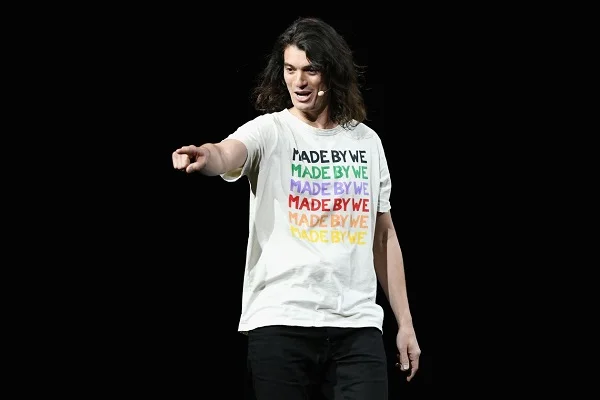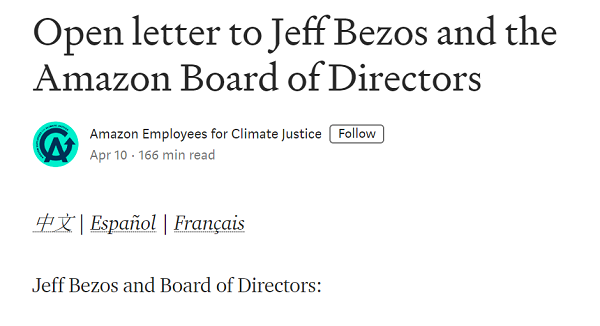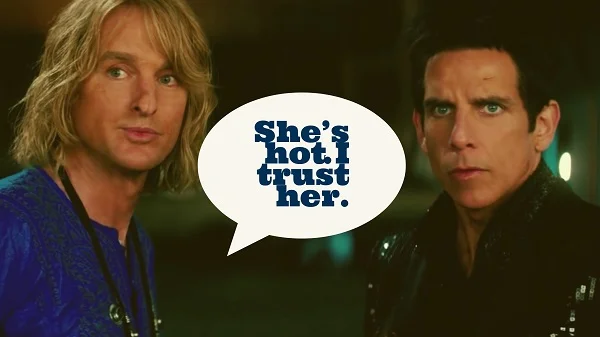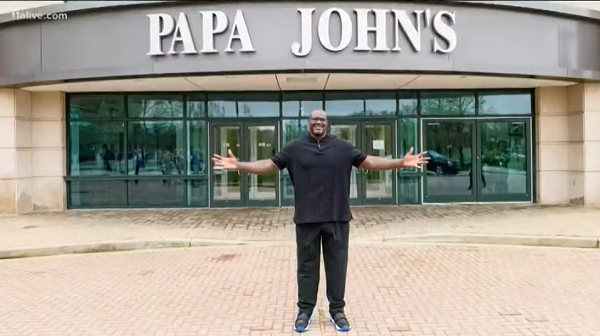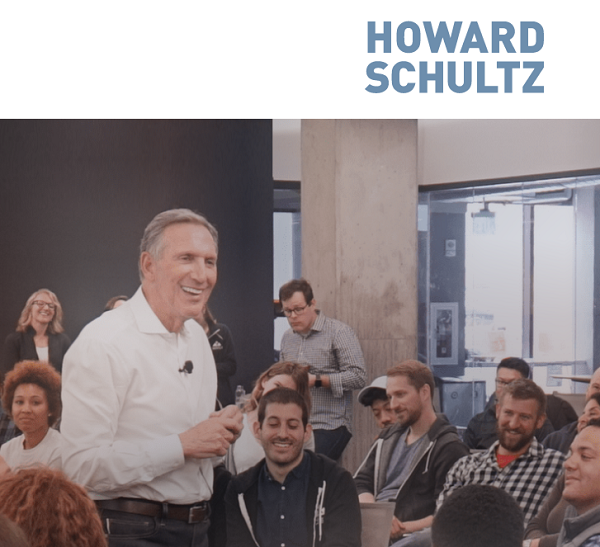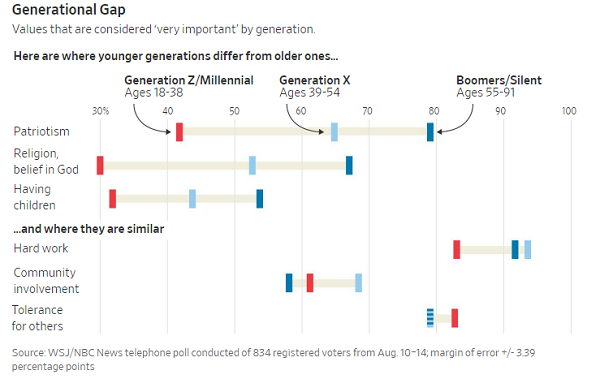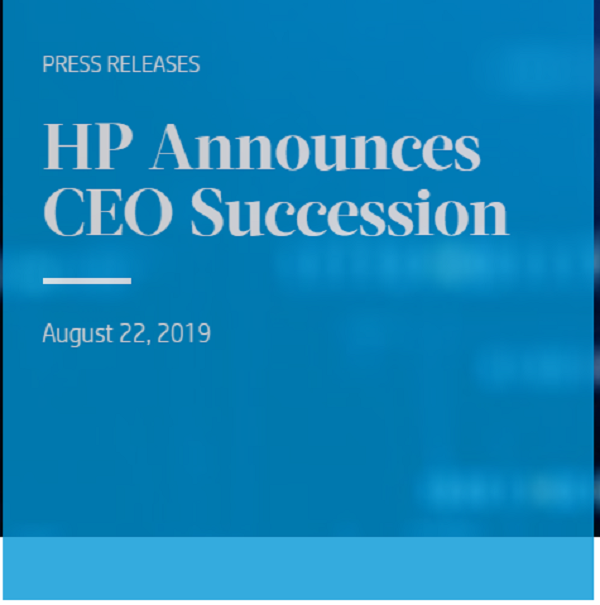Third CEO Announcement This Week: Wells Fargo
Wells Fargo announced a new CEO: former BNY Mellon, Visa CEO Charlie Scharf. According to a Bloomberg report, Scharf is “quiet-ish” and known for being “direct and willing to clean house”
Scharf joins Wells Fargo as the company battles scandals beginning in 2016, when about 2 million fake accounts were discovered. Since then, the company has faced additional ethical questions and hasn’t fully recovered its image.
In its news statement, Scharf expressed his enthusiasm for the new job:
“I am honored and energized by the opportunity to assume leadership of this great institution, which is important to our financial system and in the midst of fundamental change. I have deep respect for all the work that has taken place to transform Wells Fargo, and I look forward to working closely with the board, members of the management team, and team members. I am committed to fully engaging with all of our stakeholders including regulators, customers, elected officials, investors, and communities.”
Scharf replaces General Counsel C. Allen Parker, who was appointed interim CEO, after Tim Sloan left in 2019.
Discussion:
How well did the Wells Fargo news statement meet its communication objectives?
The news statement doesn’t mention Wells Fargo’s troubled history. Should it? Why or why not?
Industry insiders expect Scharf to make significant changes in the organization. If you were considering a position at Wells Fargo, how would this news affect your decision?
Juul CEO Steps Down
With new reports about the dangers of vaping, Juul is replacing its CEO, Kevin Burns, with former Altria tobacco executive K.C. Crosthwaite.
Following several deaths and worrying data about increasing numbers of young people vaping, the company also announced a pause in all advertising. The decision comes after major media companies and networks banned e-cigarette advertising. Juul had already stopped marketing and selling its flavored products.
The company’s news statement is typical for a CEO announcement with confidence expressed about the departing CEO (Kevin Burns), the new leadership, and the direction of the company. Below is the Kevin Burns’ quote:
“Working at JUUL Labs has been an honor and I still believe the company’s mission of eliminating combustible cigarettes is vitally important. I am very proud of my team’s efforts to lead the industry toward much needed category-wide action to tackle underage usage of these products, which are intended for adult smokers only. Since joining JUUL Labs, I have worked non-stop, helping turn a small firm into a worldwide business, so a few weeks ago I decided that now was the right time for me to step down. I am grateful to be able to confidently hand the reins to someone with K.C.’s skill set, which is well-suited to the next phase of the company’s journey.”
Discussion:
What are the communication objectives of the news statement? How well does it meet those objectives?
Assess Burns’ quote. What are the objectives of his statement, and how well does it meet those?
Altria had bought a 35% stake in Juul, so the CEO decision makes sense, and Crosthwaite is an industry insider. How do you view the decision?
WeWork Co-Founder and CEO Steps Down
WeWork announced that Adam Neumann will leave his position after controversy about the company’s financial situation and the co-founder and CEO’s behavior. Within a week, the company went from preparing for an IPO to facing criticism that led to this ouster and a delayed public offering.
The company valuation has been reduced from about $47 to $15 billion based on governance issues and what the Wall Street Journal calls “ballooning losses.” The Journal also reported on Neumann’s “eccentric behavior,” including a heavy-party lifestyle that recently involved bring marijuana on a plane to Israel and saying that he might like to be the prime minister.
In its news release, WeWork provided scant information and a few quotations, including this from Neumann:
“As co-founder of WeWork, I am so proud of this team and the incredible company that we have built over the last decade. Our global platform now spans 111 cities in 29 countries, serving more than 527,000 members each day. While our business has never been stronger, in recent weeks, the scrutiny directed toward me has become a significant distraction, and I have decided that it is in the best interest of the company to step down as chief executive. Thank you to my colleagues, our members, our landlord partners, and our investors for continuing to believe in this great business.”
Discussion:
Compare the company’s news release to others announcing CEO departures. How does this one differ, and why would the company take this approach?
What are the communication objectives of Neumann’s statement? How well does his quote meet those objectives? What else, if anything, should Neumann say or do?
Walmart Takes Another Step
In May, Walmart announced a ban on fruit-flavored e-cigarettes and sales to anyone under 21 years of age. Today, the company announced an end to all e-cigarette sales. The decision comes ahead of possible regulatory plans to ban the sale of flavored products in an effort to curb vaping among young people.
News of eight deaths and hundreds of others with pulmonary diseases has shed light on the potential dangers of vaping. A Walmart spokesperson explained the decision:
“Given the growing federal, state and local regulatory complexity and uncertainty regarding e-cigarettes, we plan to discontinue the sale of electronic nicotine delivery products at all Walmart and Sam’s Club U.S. locations.”
Walmart follows Rite Aid and Dollar General in banning e-cigarette sales. Target never sold them and stopped selling cigarettes in 1996.
After Walmart announced that it would discourage customers from openly carrying guns in its stores, Kroger, CVS, and Wegmans took similar action. That decision came after 22 were shot in an El Paso store.
Discussion:
Does this news surprise you? Why or why not?
In addition to obviously losing vaping revenue, what’s at stake for Walmart after this decision?
Some criticize the decision because Walmart still sells regular cigarettes.
We may be seeing a trend with companies leading the way in social responsibility. What’s your view?
Trudeau Responds to Criticism
Canadian Prime Minister Justin Trudeau is fighting back after photos of him in blackface and brownface emerged. The first photo was release in Time, showing Trudeau in 2001 during an “Arabian Nights” party. He was 29 years old and was teaching at a private school. Since then, Trudeau admitted that he didn’t remember how many times he worse black or brown face make-up.
The article describes Trudeau’s reaction:
“I shouldn’t have done that. I should have known better and I didn’t. I’m really sorry.” When asked if he thought the photograph was racist, he said, “Yes it was. I didn’t consider it racist at the time, but now we know better.”
Trudeau also apologized in a press conference. Within a day, Trudeau announced new gun control legislation, which The Guardian calls trying “to shift focus.”
Discussion:
Once again, why is blackface or brownface offensive?
How forgiving are you of Trudeau’s behavior? Should he resign?
Analyze his video and response to questions. How did he handle the questions?
What’s your view of Trudeau’s quick response: announcing new gun legislation? Is he smart, shrewd, shirking, or something else?
Amazon Response to Employee Walkout
Like many around the world during the Global Climate Strike, hundreds of Amazon employees walked out of their offices yesterday. Employees have been urging Amazon leaders to take more steps to reduce fossil fuel dependency and wrote an open letter back in April. The pressure seems to be working.
On Thursday, CEO Jeff Bezos announced The Climate Pledge, with the following commitments:
Commits to net zero carbon by 2040 and 100% renewable energy by 2030
Orders 100,000 fully electric delivery vehicles, the largest order ever for electric delivery vehicles
Invests $100 million in reforestation projects around the world to begin removing carbon from the atmosphere now
Launches new sustainability website to report progress on commitments
The Pledge encourages other businesses to sign on, with Amazon leading the way. Bezos said, “We’re done being in the middle of the herd on this issue — we’ve decided to use our size and scale to make a difference.” Amazon employees reacted positively.
Discussion:
Analyze the employees’ open letter. What persuasive strategies do they use? Look for examples of logical argument, emotional appeal, and credibility. What organizational strategies do the writers use?
The Amazon announcement doesn’t mention employees’ influence in the decision, although news articles and employees make the connection. Should Bezos include this recognition? Why or why not?
Describe a CEO’s dilemma in situations like these. When is it appropriate for leaders to meet their employees’ demands, and when should they resist? Did Bezos take the best course of action?
Online Reviews Written by Attractive People Carry More Weight
A study published in Consumer Marketing found that reviews written by more attractive rather than less attractive reviewers lead to “enhanced brand evaluation.” The Cornell and Penn State researchers swapped out photos of reviewers to test the impact of bias.
Marie Ozanne, assistant professor of food and beverage management in the School of Hotel Administration, explains the result:
“More often than we think, we are replicating our offline behavior online, and we don’t know the impact of all our general offline thinking on our online thinking. Hopefully, understanding it can help us be more conscious about it and find ways to focus more on the information that matters.”
Negative reviews didn’t see the same effect, which Ozanne believes illustrates how people think about products or services. When reading negative reviews, people may think more deeply about the product or service, and then the reviewer’s image becomes less important.
Image source. (Confession: I added a period after the first sentence.)
Discussion:
To what extent do you rely on online reviews?
How do you think appearance might influence your judgment—of online reviews or in other situations?
How can you ward against the effect of appearance bias?
CEOs Advocate for Gun Safety
CEOs are encouraging senators to pass stricter gun regulations, such as background checks and a “Red Flag” law that allows guns to be taken from someone who poses a threat. The leaders of 145 companies sent a letter asking for the following:
“That’s why we urge the Senate to stand with the American public and take action on gun safety by passing a bill to require background checks on all gun sales and a strong Red Flag law that would allow courts to issue life-saving extreme risk protection orders.”
The Trump Administration has implemented a ban on bump stock devices, which allows a shooter to fire in more rapid succession, and President Trump has supported more thorough background checks for gun buyers.
Discussion:
What’s your view of CEOs taking on this activist role? What is driving them, and what are the potential risks?
What observations do you have about the companies that are represented—and perhaps about those that are not?
Analyze the letter by considering the audience, communication objectives, organization, writing style, and so on. What works well, and what could be improved?
British Airways Labor Dispute Arguments
On Thursday, British Airways pilots went on strike for the second time this week, grounding about 1,700 flights. Wanting a greater share of profits, pilots have turned down the company’s offer of 11.9% in pay increases over the next three years.
Typical in these situations, the union and company blamed each other. The union, the British Airlines Pilots Association (Balpa), claims that company management chose to cancel flights instead of negotiating with them in good faith:
“Balpa set a gap between the first and second periods of strike action to give BA time to work with us to settle this dispute with their pilots. We had today been exchanging new ideas to do that via [the arbitration service] Acas and so it irresponsible and inconsiderate to its customers that BA has pulled out and decided to start cancelling flights now, just to save money on compensation. BA did not respond to our latest proposals before cancelling these flights.
“Passengers who will be affected by these cancellations should know that we have given BA multiple opportunities to work with us so we could call off this action.”
The company blames pilots for walking out:
“It is now a month since we shook hands on a pay deal. We urge [Balpa] to call off their strike and return to negotiations.
“To give our customers as much certainty as possible, we are now contacting all those affected to offer them a full refund or a rebook on an alternative date, destination or airline. We are very sorry that Balpa’s actions will affect thousands more travel plans.”
Discussion:
How effectively does each side express its perspective in the above quotes?
Research both sides of this debate. What are Balpa’s strongest and weakest arguments? What are BA’s?
What persuasive strategies does each side use in its arguments: logic, emotional appeal, and credibility?
Google Reassures Employees They Can Speak Out
The National Labor Relations Board has ordered Google to allow dissent among its workforce. Although you might think of Google as a place of open ideas, some employees feel stifled.
The first public incident was the infamous “Google Memo,” which argued conservative ideas about women. The employee was terminated—a decision some thought essential for the company, and others thought unfair.
More recently, employees have complained that management puts restrictions on what they can say, including how they express attitudes about the company on social media. But employees in the U.S. are allowed to engage in potential union organizing activity, which includes discussing pay and issues with management.
The Wall Street Journal explains the agreement between NLRB and Google, which does not include a statement of responsibility:
“The settlement orders Google to inform current employees that they are free to speak to the media—without having to ask Google higher-ups for permission—on topics such as workplace diversity and compensation, regardless of whether Google views such topics as inappropriate for the workplace.”
Discussion:
What is the value of allowing debate in the workplace? What are the drawbacks?
How can managers draw the line between employees’ right to dissent and what’s right for the company?
Have you expressed political opinions at work? When and how were they received? Have you ever felt uncomfortable during others’ discussions? What did you do?
United Air Kerfuffle
A United Airlines representative participated in an entertaining Twitter exchange about seat prices. The customer has a point: it’s silly to have empty seats on a plane. But United also has a point: the seats are more expensive, and this customer didn’t pay the extra fee.
The Lexus analogy is a curious one. The better analogy may be stadiums or theaters. In some cases, we will see people move closer to a field or a stage, but I understand (although I’ve never been) that this isn’t allowed at the U.S. Open.
Discussion:
What’s your view of United Airlines’ policy? What other examples are similar? Can you think of a better analogy?
What’s your view of the Twitter exchange? Is the customer right, antagonistic, rude, or something else? How about the United rep?
Papa John's Attempt to Rebuild the Brand
After a tough couple of years, pizza chain Papa John’s is trying a new approach: an ad campaign featuring former NBA player Shaquille O’Neal. The campaign references the company’s history with an addition to its “Better Ingredients. Better Pizza” slogan: “better day.”
Sales were down, and then the company took another hit after founder John Schnatter criticized NFL leadership for allowing players’ protests. He parted ways with the company after using the “n” word during a conference call that became public.
According to Papa John’s chief branding officer, Shaquille “represents the pied piper of fun.” From the ad here—and two others produced by the company—it’s clear that fun is a key component.
One commentator asks, “Why is Shaq in every commercial?” A video compilation shows him representing Gold Bond, Oreos, Krispy Kreme, JCPenney, Carnival Cruise, and more.
Discussion:
What’s your view of the new ad campaign? How effective do you think the campaign will be?
Is Shaq a good choice for Papa John’s spokesperson? Why would the company choose him? Is he overused by brands?
Dorian News Conferences
Local officials are holding news conferences about the impact of Hurricane Dorian.
Miami Mayor Francis Suarez announced mostly good news for the city, but he also addresses the terrible impact on the Bahamas.
Bahamas Prime Minister Hubert Minnis announced worse news: five fatalities. Since then, the number has risen to 30.
Discussion:
Compare these two presentations, particularly the content and tone. What differences do you notice?
How effectively did each government official convey the news?
What leadership character dimensions did they demonstrate?
Howard Schultz Update
Former Starbucks CEO Howard Schultz has decided not to run for president, after all. He communicated the news in an email and on his website. In the email, fonts changed in the middle, but it looks better online. At right are the first few paragraphs.
The full message explains his reasons, which include the election process and his health.
Discussion:
Analyze the message. Consider the audience, communication objectives, writing style, organization, and reasoning. What works well, and what can be improved?
At what point does he announce the news?
What are his strongest and weakest arguments for not running for president?
What causes fonts to change in the middle of an email, and how can you avoid this in your own writing?
College Board Backtracks
The College Board is reversing its position on providing an “adversity score.” The organization that oversees the SATs had introduced an index, the Environmental Context Dashboard, that assigned a rating to students. The rating incorporated data about a student’s circumstances, including poverty and crime rates.
Critics felt that a single score was an oversimplification of a student’s background. In an interview with NPR, CEO David Coleman was forthcoming about the mistake: "The first move was to admit that summing it up in a single score was a mistake, so we've stopped that."
The College Board’s official announcement couched the change in a new system: Landscape. Although the statement includes a quote from Coleman, he doesn’t admit the failing as directly:
"We listened to thoughtful criticism and made Landscape better and more transparent. Landscape provides admissions officers more consistent background information so they can fairly consider every student, no matter where they live and learn.”
Discussion:
Why would the College Board take one approach for the official statement and another during interviews? What’s your view of this approach?
How would you describe the College Board’s goals of an adversity score? In your view, does the Landscape approach still meet those goals or water them down?
How might the recent admissions scandal factor into this story?
Creative Charts
The Wall Street Journal created a chart to show what Americans value—and how those values have shifted over time. The graphic is a variation on a line chart with generations represented by color.
Understanding the chart may take a while. At first glance, the generation identifiers at the top look like headings, but they point to small bar colors.
The information is interesting, and some points probably aren’t surprising. Older Americans value patriotism, religion (which the poll describes as “belief in God”), and having children more highly than do younger Americans.
Discussion:
Assess the graphic design. How intuitive do you find the chart? What works well, and what could be improved?
What are your reactions to the data? What do you find surprising—and not?
What implications do you see for companies’ attempts to keep employees engaged at work?
The Purpose of the Corporation
The Business Roundtable published a statement, The Purpose of the Corporation, signed by 181 of its 193 members. The Roundtable, a corporate lobbying group, includes CEOs of the largest U.S. companies.
In essence, the CEOs write that they have responsibilities beyond shareholders—to customers, employees, suppliers, and communities (including the environment). The statement is a step to improving the perception of businesses as solely driven by creating shareholder value through short-term profits.
Skeptics abound. A writer for the Washington Post called the statement a “truism”:
“What’s significant about the statement is what it does not say. The corporate signatories do not suggest in any way weakening the fiduciary duties of the boards and managers of ordinary for-profit shareholder corporations to manage such companies’ affairs for shareholders’ benefit.”
The CEO of Allstate and head of the U.S. Chamber of Commerce wrote an opinion piece in the New York Times encouraging businesses to pay people more if they’re serious about serving more stakeholders.
A writer for Forbes argued that these companies are multinationals and have global responsibilities as well. He also accused the executives of being self-serving, warding off criticism about executive compensation.
Others noted company CEOs who didn’t sign, for example, Alcoa, Blackstone, GE, NextEra, Parker Hannifin, and Wells Fargo (whose representative said the CEO is interim and wasn’t asked to sign). Some companies, for example, Kaiser and State Farm, say they didn’t sign because they don’t have shareholders.
Discussion:
What’s your view of the statement: significant, placating, diverting, or something else?
Assess the statement itself. Consider the audience, purpose, writing style, organization, and so on. What works well, and what could be improved? What’s extraneous and what’s missing?
Overstock CEO Resigns
Overstock CEO Patrick Byrne resigned after admitting to a relationship with Russian agent Maria Butina. Butina is serving prison time because of her attempts to gain political access during the 2016 U.S. presidential election.
Byrne announced his decision in a letter to shareholders. He begins with the news:
“In July I came forward to a small set of journalists regarding my involvement in certain government matters. Doing so was not my first choice, but I was reminded of the damage done to our nation for three years and felt my duty as a citizen precluded me from staying silent any longer. So, I came forward in as carefully and well-managed fashion as I could. The news that I shared is bubbling (however haphazardly) into the public. Though patriotic Americans are writing me in support, my presence may affect and complicate all manner of business relationships, from insurability to strategic discussions regarding our retail business. Thus, while I believe that I did what was necessary for the good of the country, for the good of the firm, I am in the sad position of having to sever ties with Overstock, both as CEO and board member, effective Thursday August 22.”
Byrne’s letter then describes his thinking about Overstock, including blockchain technology, retail, and strategy.
This announcement came 10 days after Byrne wrote a news release titled, “Overstock.com CEO Comments on Deep State, Withholds Further Comment.” In that post, he refers to “Men in Black” and his “Omaha Rabbi,” reinforcing perceptions that Byrne is a controversial figure.
MarketWatch shows the stock performance during this period.
Discussion:
What’s your view of Byrne’s decision to resign? Consider his history with Overstock, company performance, and the company trajectory.
CNN referred to Byrne’s first news release as “strange.” Do you agree?
HP CEO Resigns
HP CEO and President Dion Weisler will step down after about four years in the position. In a news release titled, “HP Announces CEO Successor, the company identified Enrique Lores as the next company executive.
The announcement has the typical quotes, from the incoming and outgoing executives and from the board chair. Weisler’s decision is positioned as “due to a family health matter” and notes that “he will be returning home to Australia.” Chip Bergh, the board chair, reinforces the message in his quote:
“On behalf of the board, we respect Dion’s decision to support the needs of his family. We thank him for leading HP post-separation, building a strong team and restoring the company to drive strong shareholder value creation over the last four years.”
In after-hours trading, HP shares dropped more than 6%, according to a Wall Street Journal article.
Discussion:
How does this company news release compare to others announcing CEO resignations, for example, Overstock?
What’s your view of mentioning Weisler’s personal situation in the announcement? Why would the company include this? From Weisler’s point of view, what are the reasons to include or exclude this information?
Research About Befriending Your Boss
A Wall Street Journal article describes the positive and negative effects of being friends with your boss. Research shows that managers do give preferential treatment to employees they consider friends.
However, a study published in the Journal of Experimental Social Psychology demonstrates that managers may favor others when decisions are public. To avoid perceptions of bias, Alex Shaw, an assistant professor of psychology at the University of Chicago, offers three solutions for managers:
Recuse yourself. I’m skeptical about this because a manager’s job is to make such decisions, but I see the point: if you can get out of being the final decision maker, that might be best in some situations.
Make the criteria public. This is a good practice, anyway, to ensure transparency in decisions, particularly those that are sensitive and affect people personally.
Ask for opinions. This could work, for example, when peer feedback may be as relevant—or more relevant—than the manager’s point of view.
Discussion:
Have you considered a boss a friend? How might the relationship have affected decisions?
What’s your view of the strategies suggested here? In what types of situations could each work or backfire?





